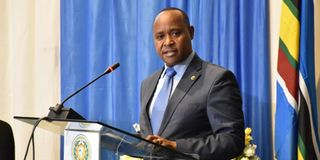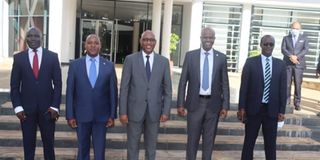Kenya's Peter Mathuki officially takes over as EAC secretary-general

Dr Peter Mathuki, the East African Community's new secretary-general, delivers his speech after formally taking over on April 23, 2021.
What you need to know:
- Dr Peter Mathuki is no stranger to EAC, having also been an Eala member, but he has the big task of saving the community from its current woes.
Arusha,
Dr Peter Mathuki, a former member of the East African Legislative Assembly (Eala) from Kenya, has officially taken over as the secretary-general of the East African Community (EAC) for the next five years.
Dr Mathuki is the sixth EAC secretary-general and the second from Kenya, the first one being Francis Muthaura, who served from 1996 to 2001.
The others Nuwe Amanya Mushega from Uganda (2001-2006), Tanzania’s Juma Mwapachu (2006-2011), Richard Sezibera from Rwanda (2011-2016) and Burundi’s Liberat Mfumukeko (2016-2021).
The handing over ceremony on Friday was preceded by a closed session with all the top EAC executives.
Dr Mathuki, formerly the executive director of the East African Business Council (EABC), succeeds Liberat Mfumukeko of Burundi, who service from April 25, 2016.
He will hold the position for five years - the tenure of the EAC chief executive officer is a five-year, non-renewable term.
Dr Mathuki is no stranger to the EAC, having been an Eala member from Kenya. He has a comparative advantage, not so much as a regional legislator (2012-2017) but as the CEO of the Arusha-based business body.
EAC challenges
But analysts say he faces the big task of freeing the community from its woes.
The EABC is an apex body of private sector associations and corporates and has an observer status with the EAC, technically serving as its business arm.
With his diplomacy and well established contacts in the business and civil society sectors, he can pursue his advocacy against trade barriers.
The main task ahead of the Kenyan politician is addressing the old and emerging challenges facing the six nation regional organisation.
He is taking over when EAC has been forced to do away with the old order, including a gazillion high and low profile workshops, conferences and meetings.
Some of the gatherings had been replaced by video conferences long before the Covid-19 pandemic, although not much utilised for different reasons.
One of the organs which has stuck to the new change is Eala, whose virtual sessions have been held unabated. It is with the new technology that Dr Mathuki and his executive team have to take action - given the ongoing behind-the-scenes turmoil between the EAC and Eala.

President Uhuru Kenyatta with Dr Peter Mutuku Mathuki, the incoming East African Community secretary-general, at State House in Nairobi on February 26, 2021.
Tug of war
The EAC Secretariat - the executive arm of the community - has for the past year been at loggerheads with Eala over eligible payments not requiring travel.
Since the outbreak of the pandemic in the region around March last year, most of the regional MPs have attended the virtual Eala meetings from the comfort of their offices, homes or EAC ministry offices.
This caused them to miss their daily subsistence allowance s(DSA) because the EAC's financial regulations insisted such payments must be made only in the case of travel.
As the tug of war rages between the two key organs, the EAC remains generally short of funds to implement a host of development projects and routine operations.
Although the donor dependency of the annual budget has kept on declining compared to five to 10 years ago, timely remittances from the partner States have dropped.
The situation worsened in the past two years with the secretariat forced to borrow money from the General Reserve to meet pressing financial obligations.
The problem has been delayed remittances to the Arusha coffers by some partner States and some countries' tendency not to settle their bills.
For the past 10 years or so, the annual expenditure budget for the community has averaged $100 million. Half of the amount has to be contributed by the member countries.

Outgoing EAC Secretary-General Liberat Mfumukeko (fourth left), his successor Dr Peter Mathuki (second left), Chair of Council Adan Mohamed (third left) and other ministers from partner States during the handing over ceremony on April 23, 2021.
Financial mechanism
Regional analysts have been at pains to understand why some countries are not paying, the feeling being that some are not committed to the integration agenda.
It is also said that all the EAC partner states are undergoing economic crises due to emerging issues such as Covid-19, which has paralysed tourism and other sectors.
Dr Mathuki has also to revisit the proposed alternative financial mechanism to enable the EAC to collect its own expenditure from taxes on imported goods.
He could see to an expanding EAC with the likely admission of the Democratic Republic of Congo (DRC) and other countries.
This could also see to the establishment of more EAC organs and institutions in addition to the current three organs and a dozen institutions spread across the region.





